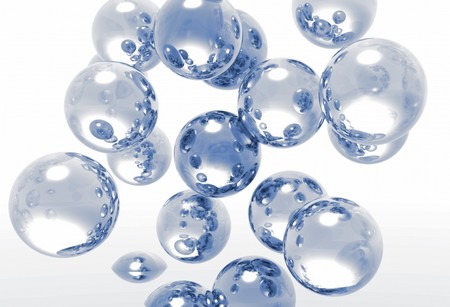Wednesday Bubble: Why?

Would you prefer to have a better sex drive and a beard? Or the opposite?
Can’t decide?
About a week and a half ago, news hit the headlines about a new FDA-approved testosterone patch for women to restore declining libidos. The patch, called Intrinsa, was tested in a study of 841postmenopausal not currently on hormone replacement therapy who received either one of two doses of the patch or a dummy placebo patch over 52 weeks. The patch’s effectiveness (namely, restoring sexual satisfaction) was measured up to week 24, or for roughly half the study.
The results, which were published in the esteemed New England Journal of Medicine, showed that compared to a dummy patch, using Intrinsa was associated with significant increases in sexual desire and a decline in sexual distress. Overall, the higher dose patch led to modest improvements in sexual function.
In other words, wearing a patch was significantly better than using nothing at all but not life-shattering in terms of improving sexual function.
The caveat? Unwanted hair growth, which occurred in about a third of women using the higher dose patch and in about 23% of women using the lower dose.
Results of this study undoubtedly leave hope for women in menopause experiencing declines in sexual function. In fact, I’ve written previously about the positive effects of taking testosterone to improve sexual desire. However, I’ve also found some evidence that testosterone increases the risk of metabolic syndrome and heart disease in women.
The other rub? You have to use the patch all the time, which means that you are subjecting yourself to testosterone and negative side effects, such as hair growth, 24/7. Researchers don’t have any answers about the safety of long-term use.
Fortunately, there are some very positive steps you can take to improve menopausal declines in sexual desire and function, which Dr. Christine Northrup says, are often misnomers. So, I leave you with this:
Why would you risk unwanted hair growth and other yet to be defined side effects when you can solve the problem in a positive, affirming, healthy way?
More to come!
Read MoreWalk on by
[youtube=http://www.youtube.com/watch?v=0R-ZE-gFcBA]
Lord I need a new attitude; I’ve been in hormonal hell for the past 5 days.
Menopause Divas, you KNOW what I’m talking about. Hormonal Hell, that valley between crying and killing where everything hurts just a wee bit – head, back, stomach, eyes – you name it.
There have been moments of clarity and fun, laughs, smiles… But I keep ending up back in the valley.
This morning, I tried to find a few menopause jokes to cheer me up. Mood ring, light bulb, change, seven dwarfs…you name it. I don’t find any of these all that funny (if you’re wondering what the heck I’m talking about, just do a search for menopause jokes on Google). Even the tee “Does this shirt make me look menopausal?” didn’t work.
I’ve tried an hour of aerobics for the past two days.
Nope, hasn’t worked.
A little bit of retail therapy.
Nope.
Red velvet cake.
Nope.
So, Mistress Estrogen, evil queen of my present domain, I give in. And if you see me on the street and I look, well, menopausal, please walk on by. I’ll be back soon.
Read MoreSex on the beach

Okay. I’m not really going to write about having sex on a beach or that tropical drink. But now that I have your attention, I want to bring attention to a new study that I stumbled across recently.
This particular topic is of interest to me and clearly, I’ve written about sex and the transition numerous times. And since I’m in the middle of Dr. Christine Northrup’s ‘The Secret Pleasures of Menopause’ I do have sex on the brain at the moment. More on the book at a later date.
Although sexual concerns are reportedly very common among menopausal women, low sexual function can be attributed to many factors, including attitudes and beliefs about the transition, changes in body image, health, stress, fatigue, partner’s sexual function, and the role of intimacy in the relationship. Importantly, up to 47% of women may experience depression during menopause and in fact, findings from the Massachusetts Women’s Health Study suggest that aging and menopause affect sexual function less than general and mental health.
In this particular study, published in the online edition of the journal Maturitas, Turkish researchers evaluated association between depression and change in sexual function in 300 women in menopause.
Among the participants, 65% had low sexual function. This included low desire (40%), low arousal (82.7%), low lubrication (63%), low orgasm (75%), low satisfaction (82.7%), and pain during sexual activity (54.3%).
Although only a third (29.3%) of women were identified as having depression, the researchers found a significant association between desire and depression scores throughout the menopausal transition. As depression increased, so did sexual dysfunction.
These findings imply that sexual dysfunction during menoapuse may be as much a result of atttitude and emotional health as hormones if not more so.
Dr. Christine Northrup explores some interesting solution to these problems. Stay tuned!
Read MoreWednesday Bubble: Testosterone and the metabolic syndrome

Today’s Bubble features a pretty interesting research finding: contrary to what experts have previously believed about the relationship between estrogen and the metabolic syndome evidence continues to accrue that testosterone may ultimately be identified as the culprit. I wrote about this in an earlier post and there are some interesting stats about risk, etc. (You may recall that metabolic syndrome describes the cluster of heart disease risk factors that include overweight, high blood pressure and blood sugar levels, high blood fats levels and low HDL-cholesterol.)
In the current study, published in the early online edition of the Menopause Journal, researchers evaluated 257 cases of metabolic syndrome found in a group of 1862 women enrolled in the Study of Women’s Health Across the Nation.
They found that the ratio of testosterone to estrogen during the menopausal transition, rather than changes in each individual hormone, was an important factor in determining which who would develop the metabolic syndrome. What’s more, faster increases in this ratio over time also increased risk.
What this brings to mind is the question of whether or not it is wise to use testosterone to improve sexual dysfunction during menopause? I’m going to be addressing this in a future post.
Read MoreMarijuana and…menopause?
I was intrigued when a colleague of mine sent me research galleys of a new paper he’s co-authored. The subject matter? Confirmation that marijuana has potentially been used for medicinal purposes for centuries.
The new research, published online in the advanced edition of the Journal of Experimental Botany,* focuses on the contents of a 2700 year old grave found in the Xinjiang-Uighur Autonomous Region in China. The grave reportedly belonged to a shaman of the Gushi clan. The current study expanded on earlier research to confirm the botanical, photochemical and genetic characteristics of the agent, and that it contained psychoactive components, thereby clarifying how it was likely used.
So, why is this important and what does it have to do with menopause anyhow?
Regular readers of this blog know that I am a huge proponent of integrative medicine, i.e. combining the best of western and eastern medicine to come up with an effective therapeutic approach. In fact, I’ve written numerous posts on the value of Chinese medicine to women in menopause who are looking for alternative strategies for their symptoms.
And so, this research lends further proof that herbal medicine has been practiced for centuries and for good reason: it works. Not for everybody (what drug does?) and not all the time and clearly, careful selection of standardized products is essential, as is consulting with a practitioner certified in herbal medicine. I provide links on this site to a few organizations where you can delve deeper into these alternative paths.
Personally, I would be thrilled if researchers discovered that cannabis can be effectively used to treat menopausal symptoms. But in the interim, I am happy to report that it has been shown to be effective in relieving the pain of migraines, reducing involuntary muscle contractions associated with multiple sclerosis and of course, calming nausea in people undergoing chemotherapy.
For critics who say that smoking a drug counteracts all of its potential benefits, I say, take a look at what GW pharmaceuticals is doing with their oral spray, Sativex.
Sativex removes the psychoactive components or cannabinoids and leaves the therapeutic form intact. Thus far, well designed clinical trials have shown it to be effective for pain of cancer, rheumatoid arthritis, multiple sclerosis, and nerve or neuropathic conditions.
So I salute Dr. Ethan Russo and his Chinese colleagues Hong-En Jiang, Xiao Li and others, for their dedication and hard work and a wonderful paper.
Thank you for furthering proof that there is and has always been a place for alternative strategies.
*Note – this has not yet been posted in the online edition of the journal. Full citation is:
Russo EB, Jiang HE, Li X et al. Phytochemical and genetic analyses of ancient cannabis
from Central Asia. J Experim Bot. doi:10.1093/jxb/ern260.
Abstract:
The Yanghai Tombs near Turpan, Xinjiang-Uighur
Autonomous Region, China have recently been excavated
to reveal the 2700-year-old grave of a Caucasoid
shaman whose accoutrements included a large cache
30 of cannabis, superbly preserved by climatic and burial
conditions. A multidisciplinary international team demonstrated
through botanical examination, phytochemical
investigation, and genetic deoxyribonucleic acid
analysis by polymerase chain reaction that this mate-
35 rial contained tetrahydrocannabinol, the psychoactive
component of cannabis, its oxidative degradation
product, cannabinol, other metabolites, and its synthetic
enzyme, tetrahydrocannabinolic acid synthase,
as well as a novel genetic variant with two single
40 nucleotide polymorphisms. The cannabis was presumably
employed by this culture as a medicinal or
psychoactive agent, or an aid to divination. To our
knowledge, these investigations provide the oldest
documentation of cannabis as a pharmacologically
active agent, and contribute to the medical and 45
archaeological record of this pre-Silk Road culture.
Key words: Archaeology, botany, cannabis, cannabinoids,
archaeobotany, ethnopharmacology,






